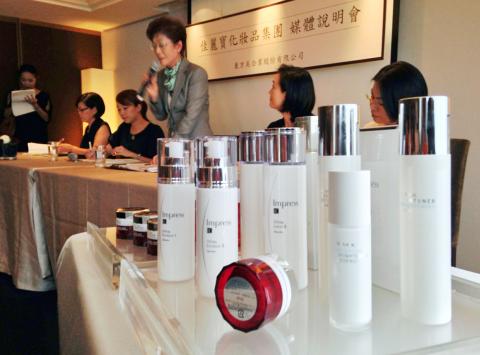Tung Fang Mei Enterprise Co Ltd (東方美), the local agent for Japanese cosmetics brand Kanebo, said it has taken 12 products off the nation’s shelves after Kanebo announced a recall yesterday.
Kanebo recalled 54 skin-whitening products across Asia after complaints they caused discoloring that does not clear up even after use of the products was discontinued.
The products contain a substance called Rhododendrol, or 4HPB, a synthetic version of a natural compound that the firm developed, Kanebo said.

Photo: CNA
Taiwan is the largest overseas market for the products, a Kanebo spokesman in Japan told Agence France-Presse (AFP).
Consumers in Taiwan who have bought the 12 products can return them in exchange for other products until Aug. 10, Tung Fang Mei said in a statement.
It said that sales of the product were being suspended only to allay customer concerns and not because the products were problematic.
Questions have not been raised about the ingredient in any market except Japan, the statement said.
“Some consumers complained that they had white patches on their skin after using the products, and we suspect a link between the condition and 4HPB,” a Kanebo spokeswoman in Japan said.
Taiwan’s Department of Health said there have been no reports of irritation from consumers.
Major department store chains — Pacific Sogo Department Stores Co (太平洋崇光百貨), Shin Kong Mitsukoshi Department Store Co (新光三越百貨), and Far Eastern Department Stores Co (遠東百貨) — have said they will help customers who want to return the 12 products.
A Kanebo company spokesman later told AFP the company had received 39 complaints from customers in Japan since May. Fifteen had shown no improvement in their conditions even after they stopped using the products, he said.
“The problem was initially thought to be a type of skin disease, but there was a growing concern the condition could be linked to 4HPB,” which led the company to recall the products, the spokesman said.
The company has shipped a total of 4.36 million products in Japan and is recalling 450,000 that have already been sold, as well as all inventory from the Japanese market.
A total of 370,000 items have been sent to overseas markets, but at present Kanebo only plans to recall items that are on sale.
The sales suspended by Tung Fang Mei include products in the Blanchir Superior series — White Deep Clear Conditioner, White Deep Milky Conditioner and White Deep Night Conditioner — and those in the Impress series — Impress IC White Lotion, Impress IC White Emulsion, Impress IC White Fit Mask 3D and Impress Granmula Lotion.
The recall also covers Hong Kong, South Korea, Thailand, Singapore, Malaysia, Indonesia, Myanmar, the Philippines and Vietnam.

A Chinese aircraft carrier group entered Japan’s economic waters over the weekend, before exiting to conduct drills involving fighter jets, the Japanese Ministry of Defense said yesterday. The Liaoning aircraft carrier, two missile destroyers and one fast combat supply ship sailed about 300km southwest of Japan’s easternmost island of Minamitori on Saturday, a ministry statement said. It was the first time a Chinese aircraft carrier had entered that part of Japan’s exclusive economic zone (EEZ), a ministry spokesman said. “We think the Chinese military is trying to improve its operational capability and ability to conduct operations in distant areas,” the spokesman said. China’s growing

Nine retired generals from Taiwan, Japan and the US have been invited to participate in a tabletop exercise hosted by the Taipei School of Economics and Political Science Foundation tomorrow and Wednesday that simulates a potential Chinese invasion of Taiwan in 2030, the foundation said yesterday. The five retired Taiwanese generals would include retired admiral Lee Hsi-min (李喜明), joined by retired US Navy admiral Michael Mullen and former chief of staff of the Japan Self-Defense Forces general Shigeru Iwasaki, it said. The simulation aims to offer strategic insights into regional security and peace in the Taiwan Strait, it added. Foundation chair Huang Huang-hsiung

PUBLIC WARNING: The two students had been tricked into going to Hong Kong for a ‘high-paying’ job, which sent them to a scam center in Cambodia Police warned the public not to trust job advertisements touting high pay abroad following the return of two college students over the weekend who had been trafficked and forced to work at a cyberscam center in Cambodia. The two victims, surnamed Lee (李), 18, and Lin (林), 19, were interviewed by police after landing in Taiwan on Saturday. Taichung’s Chingshui Police Precinct said in a statement yesterday that the two students are good friends, and Lin had suspended her studies after seeing the ad promising good pay to work in Hong Kong. Lee’s grandfather on Thursday reported to police that Lee had sent

BUILDUP: US General Dan Caine said Chinese military maneuvers are not routine exercises, but instead are ‘rehearsals for a forced unification’ with Taiwan China poses an increasingly aggressive threat to the US and deterring Beijing is the Pentagon’s top regional priority amid its rapid military buildup and invasion drills near Taiwan, US Secretary of Defense Pete Hegseth said on Tuesday. “Our pacing threat is communist China,” Hegseth told the US House of Representatives Appropriations Subcommittee on Defense during an oversight hearing with US General Dan Caine, chairman of the Joint Chiefs of Staff. “Beijing is preparing for war in the Indo-Pacific as part of its broader strategy to dominate that region and then the world,” Hegseth said, adding that if it succeeds, it could derail